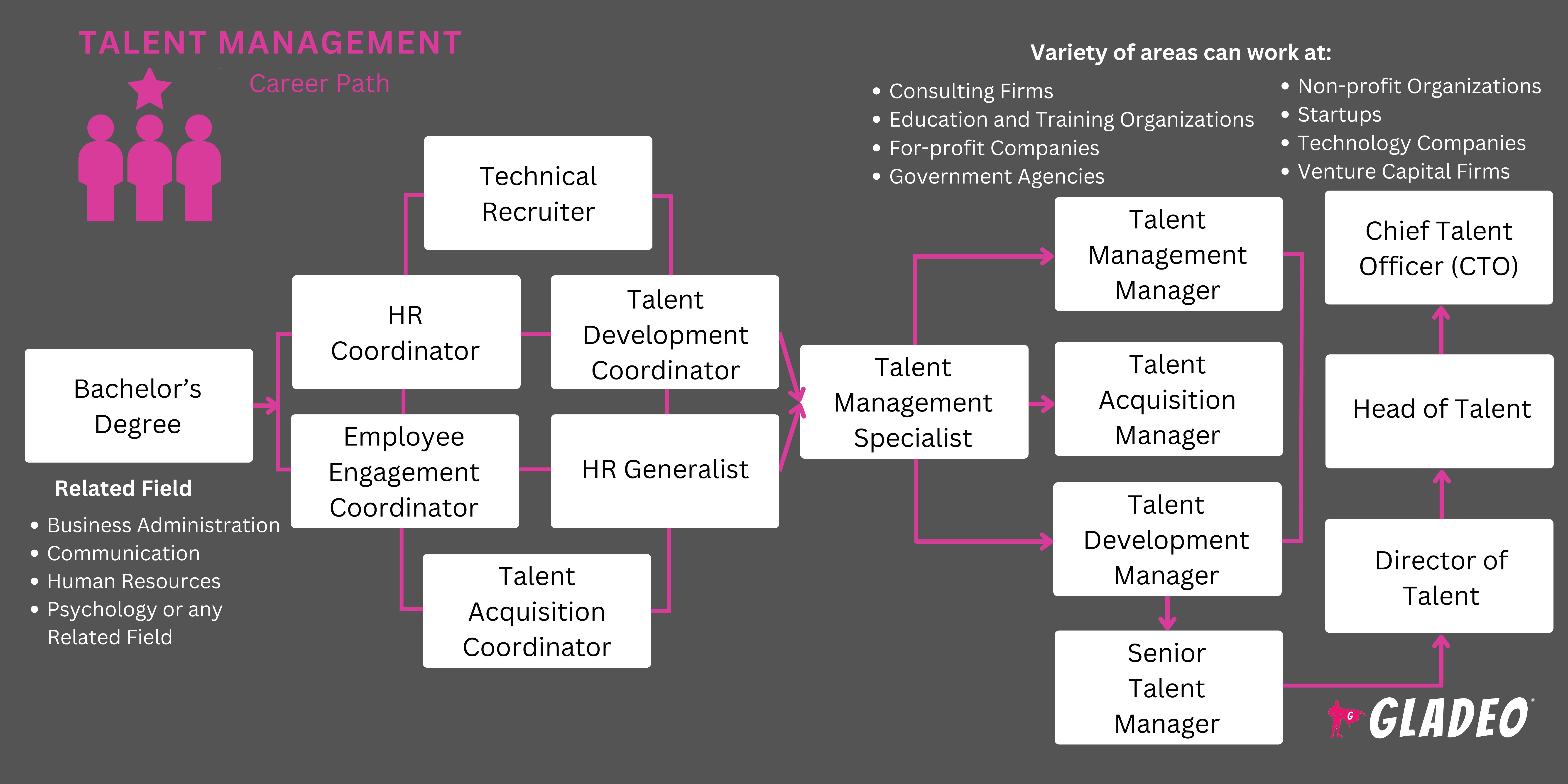聚光灯
人力资源经理(侧重于人才管理)、人才招聘专家/经理、学习与发展经理、组织发展专家/经理、员工参与专家/经理、继任规划专家/经理、绩效管理专家/经理、职业发展顾问/经理、劳动力规划专家/经理、人力资本顾问
All organizations have one thing in common – they need to find, train, and keep talented people!
From recruitment to onboarding, Talent Management Specialists help organizations locate and attract people with the right skills, aptitudes, and cultural fit. They may even manage aspects of an employee’s career, helping workers develop to their fullest potential. To do this, specialists implement performance management programs to gauge employee progress and productivity, while promoting continuous improvement.
Talent Management Specialists collaborate with managers and human resources specialists to identify workforce needs, create employee development plans, and devise strategies to replace personnel who may leave soon due to retirement, relocation, or other reasons. Ultimately, their work is crucial to nurturing a workplace that attracts top talent and bolsters employee satisfaction and retention.
- Directly contributing to organizational success
- Empowering employees to reach their full potential
- Collaborating with diverse teams and departments
- Utilizing modern HR programs and methods
工作日程
- Talent Management Specialists typically work full-time, with overtime, nights, and weekend work possible. They may travel for recruitment events or training sessions.
典型职责
- Develop and implement talent acquisition and management policies and strategies
- Assess current and future workforce talent gaps
- Collaborate with HR and department heads regarding personnel needs
- Oversee recruitment, onboarding, and retention programs
- Visit college campuses. Attend job fairs or other recruitment events
- Screen and interview candidates. Call or email references
- Conduct pre-employment assessments, in some cases, to measure skills, job knowledge (or mastery), personality, integrity, physical ability, or other tests pertinent to the role
- Verify candidates’ education and prior employment history
- Initiate security clearance checks, criminal background checks, credit checks, or conduct substance screening, per employer requirements
- Design and manage training and development initiatives
- Implement performance management systems
- Develop succession planning frameworks
- Monitor employee satisfaction rates
- Facilitate leadership development and coaching programs
- Work with HR to extend offers to hire with details related to terms and conditions of employment or contract
额外责任
- Refer highly qualified candidates who were not hired to other potential employers
- Use applicable HR software and data analytics tools
- Ensure compliance with employment laws and regulations
- Stay up-to-date on trends and best practices
软技能
- 分析性的
- 沟通技巧
- 注重细节
- 情绪智力
- 同理心
- 领导人
- 谈判
- 组织机构
- 劝说性
- 规划
- 解决问题
- 战略思维
- 团队合作
- 时间管理
技术技能
- Data analysis and HR analytics programs, such as ADP Workforce
Now, BambooHR, IBM Kenexa, Oracle HCM Cloud, Tableau, Visier, and Workday - Human capital management (i.e., “the process of hiring the right people, managing workforces effectively and optimizing productivity,” per ADP)
- Knowledge of employment laws and regulations
- Performance management systems
- Recruitment software
- Talent development frameworks
- Training program design
- Workforce planning
- Employment services
- 公司
- 教育机构
- 政府机构
- Healthcare organizations
- 非营利组织
- 科技公司
Talent Management Specialists are on the hook to ensure their organizations have the right workforce to reach established goals. That means balancing strategic planning with day-to-day tasks such as recruitment and employee development. At the same time, competing organizations have their own experts out there trying to snag the top candidates, too.
Strong interpersonal skills are essential to build trust and foster positive relationships with leadership and employees. There’s also the challenge of managing expectations from both sides!
Employees, for instance, obviously want fair career growth opportunities. Managers might focus more on increased productivity and strategic alignment with organizational goals. Talent Management Specialists have to navigate the demands of all parties to ensure optimal outcomes for all. When situations become high-pressure, such as during major organizational changes and staff shake-ups, they’ve got to be the voice of reason, keeping things calm while making prudent decisions.
In today’s bustling business landscape, talent management relies heavily on technology. Data analytics and AI have transformed how organizations predict talent needs by finding skill gaps. This helps to optimize workforce planning and align talent acquisition strategies with short and long-term goals.
Employee wellness is also in the spotlight when it comes to talent management. Companies are integrating wellness programs, mental health resources, and stress management workshops in the hopes of building resiliency and boosting productivity.
Meanwhile, remote work and flexible schedules are causing talent managers to develop new strategies for engaging dispersed teams. Flexibility and innovative communication methods are necessary to attract top talent and improve retention in the modern world of remote and hybrid work!
Talent Management Specialists often have a passion for helping others and an interest in human behavior. They might have enjoyed activities that involve teamwork and organizing events or projects.
- Talent Management Specialists typically need a bachelor’s degree in human resources, business administration, communications, or a related field
- Relevant coursework might include:
- Employment law
- Human resource management
- Organizational behavior
- Training and development
- Workforce planning
- Many Talent Management Specialists start in other HR-related roles, gaining experience and working their way up
- A master's degree or specialized certifications can enhance job prospects and career advancement. Certifications may include:
- American Academy of Project Management - Certified Human Resource Analyst
- Human Capital Institute certifications
- Human Resource Certification Institute - Professional in Human Resources
- International Coach Federation - Professional Certified Coach
- Oracle - Talent Management
- Society for Human Resource Management - Certified Professional
- Talent Management Institute - Certified Talent Management Practitioner
- Look for accredited colleges offering majors in human resources, business administration, or communications.
- Prospective students should seek programs with experienced faculty, strong industry connections, and internship or co-op placement opportunities.
- 比较学杂费,注意州内与州外的费用。
- 查看奖学金和经济援助选项。
- 查看毕业和就业安置统计数据。
- In high school, you’ll need to master a lot of subjects, including psychology, business, and communications
- To hone your negotiation skills, take English, writing, speech, debate, and foreign languages
- Participate in leadership and team-building activities
- Apply for part-time HR-related jobs, internships, or apprenticeships
- 完善你的电话礼仪和说服力
- 自愿加入学校委员会。帮助开展课外活动,重点是提供领导和管理经验的角色
- Take online courses via edX or Udemy to polish up your talent management skills
- Call organizations to ask if you can shadow a recruiter or get an informational interview
- Read articles and magazines related to the industry, such as Talent Magazine
- 参与相关的在线论坛和讨论组
- Keep track of your accomplishments for your resume and college applications
- Join professional HR organizations like the Society for Human Resource Management to network, learn, and have fun!
- Stay informed about trends in talent management and HR technologies

- 扫描Indeed.com、Glassdoor、ZipRecruiter、USAJOBS 等招聘门户网站
- 查看招聘广告,寻找可在简历中列出的关键字,如
- Applicant Tracking Systems
- Candidate Sourcing
- Employee Relations
- Human Capital Management
- HR Compliance
- Interviewing
- Onboarding
- Performance Management
- Recruitment Strategies
- Talent Acquisition
- Review Talent Management Specialist resume templates
- Read sample interview questions and practice your replies via mock interviews. Sample questions might include:
- “What strategies have you found most effective in sourcing high-quality candidates?”
- “How do you assess cultural fit during the interview process? What methods do you use to determine if a candidate will align with the company’s values and work environment?”
- Stay connected to your professional network. Ask for leads on upcoming job openings
- 面试时穿着得体!
- Ask former professors and supervisors to write recommendation letters or request their consent to list them as references
- Network with HR professionals and attend industry events
- Leverage your university’s career center for resume reviews and mock interviews
- The best way to move up is to find and retain the best people for your organization!
- Let your supervisor know you are interested in advancement. Offer to take the lead on tough projects or trips
- Knock out additional education and training to improve or add to your skills. For example, you could become a Certified Talent Management Practitioner certification…or earn a master’s degree
- Master’s options include:
> Master of Arts in Organizational Psychology
> MBA with a concentration in HR or Talent Management
> Master of Science in Organizational Leadership
> Master’s in Human Resource Management
> Master’s in Industrial and Labor Relations
- Get certified in the software programs you need for your job, such as Oracle’s Talent Management Cloud
- Treat everyone with respect, be proactive in finding and mitigating problems, offer realistic solutions, and stay focused on maintaining strong relationships between workers and management
- Keep growing your professional network and making connections
- Seek feedback from supervisors and employees to improve performance or programs
- Stay active in the industry and join professional HR associations
- Consider relocation or switching employers, if needed to move up
网站
- Association for Psychological Science
- 人才发展协会
- BambooHR
- Chartered Institute of Personnel and Development
- 大专院校人力资源专业协会
- Employee Benefit Research Institute
- Gallup Workplace
- Glassdoor for Employers
- 哈佛商业评论
- 人力资源认证学院
- HR Dive
- HR Technologist
- Human Capital Institute
- International Coach Federation
- Learning and Performance Institute
- LinkedIn Talent Solutions
- 全国人力资源协会
- 公共部门人力资源协会
- 人力资源管理协会
- Talent Magazine
- Talent Management Alliance
- Talent Management Institute
- The Conference Board
- The NeuroLeadership Institute
- The Talent Strategy Group
- Training Industry
- Workday
- 世界在工作
书籍
- The Talent Management Handbook, by Lance and Dorothy Berger
- Effective Talent Management: Aligning Strategy, People, and Performance, by Mark Wilcox
- Talent Wins: The New Playbook for Putting People First, by Ram Charan, Dominic Barton, and Dennis Carey
新闻联播

特色工作

在线课程和工具







